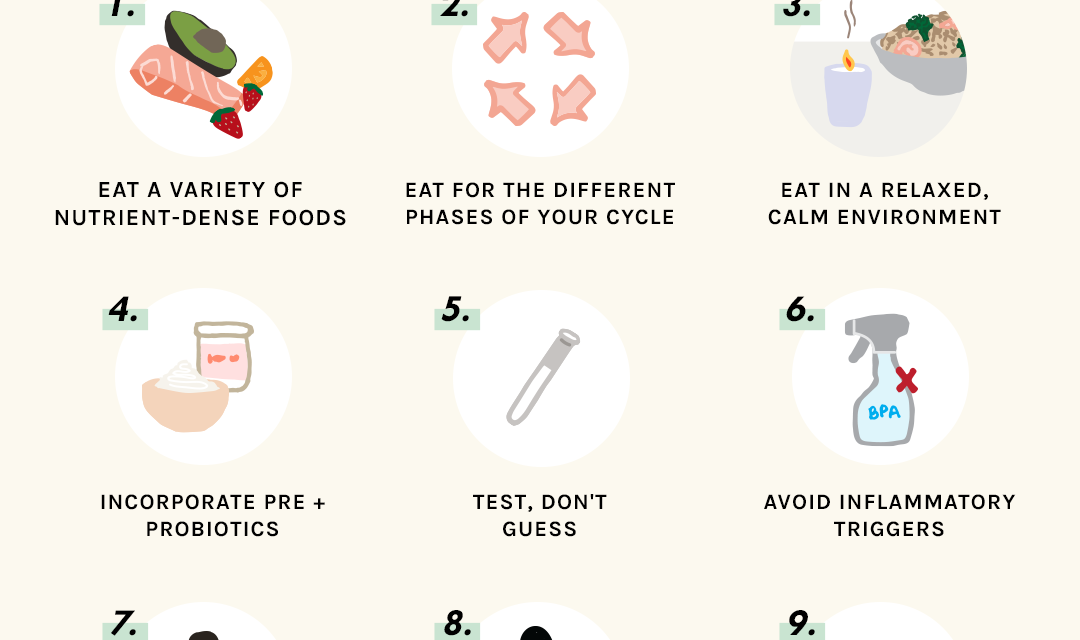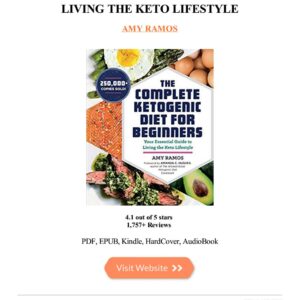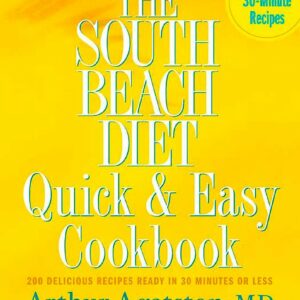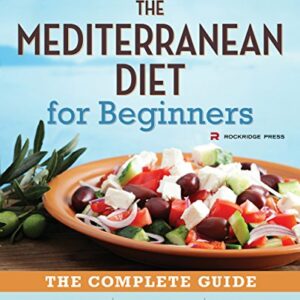Written By: Heidi Emery, RD
Do you struggle with bloating or unpredictable bathroom trips? Are you always getting sick? Can’t focus? Intense cravings?
Sound familiar? If yes, it sounds like you may not have the best gut health. Read on to learn about what may be causing these issues and how to begin to solve them!
Learn From A Registered Dietitian How To Eat For A Healthy Gut
First, let’s look at some gut health facts!
Did you know, that your gut is made up of trillions of cells, is home to your immune system, and is significantly impacted by the foods you eat and medications you take? You can control the majority of your “good” and “bad” gut bacteria by just doing a few simple things such as eating a healthy diet, exercising, and reducing stress. Nutrient-rich foods help to improve your good gut bacteria, while more processed foods can increase the bad bacteria and cause inflammation in your gut. Exercising, independent of food, also helps to improve your good gut bacteria! Decreasing stress through activities such as meditating have showing to improve digestion and overall gut health. In fact, at least 90% of serotonin (mood balancing and boosting hormone) is produced in the small intestine (3).
Canada has one of the highest rates of irritable bowel syndrome (IBS) in the world, at about 18% compared to 11% globally. With this, 40% of those suffering from IBS also experience high rates of anxiety and depression. IBS can be caused or aggravated by an unhealthy gut. Additionally, twice as many women suffer from digestive health issues on a weekly basis compared to men. When high levels of estrogen and progesterone (female sex hormones) interfere with the gut, they can slow its motility.
What Is ‘Gut Health’ And Digestion?
‘Gut health’ is a general term that usually refers to the digestion, absorption and elimination of compounds of foods we consume, and includes the function of many digestive system organs, including the stomach, small intestines and large intestines, or colon. Digestion is breaking down the foods we eat into small enough compounds that we can absorb them and the ‘breakdown’ of food is one of the most common issues that can affect gut health. However, keep in mind that ‘gut health’ also requires good absorption and elimination! In general, a healthy gut is one that can defend us against invading pathogens, break down and absorb the nutrients we need, as well as get rid of the items we don’t need.
So How Important Is Our Gut Health And Why Should We Focus On It?
Only 10% of the cells in the human body consist of human cells, with the rest coming from bacterial cells. The number of bacterial cells living in the human gut is about 10 times higher than the number of cells that shape the human body (1). Gut health directly impacts the digestive system and how well it functions. Likewise, the digestive system impacts the state of your gut health! Improper digestion can lead to an imbalance in the gut microbiome and similarly, a lack of proper gut bacteria can alter the digestion, absorption and elimination process of food. Healthy eating habits, including the types of foods you choose and the way you eat them, lead to a healthier gut and better digestion!
Healthy eating habits include consuming a variety of food, a plant-rich diet, staying hydrated and eating mindfully. Eating a variety of foods increases your likelihood of consuming adequate nutrients such as proteins, fats, carbohydrates, fibre, vitamins and minerals. A plant-rich diet is associated with higher consumption of fruits and vegetables, which are crucial for a healthy gut! Making water your drink of choice and drinking enough water allows for optimal transportation and metabolization of nutrients, allowing the good gut flora to flourish. Last, but not least, eating mindfully typically leads to eating slower and reduces stress, which improves the digestion and elimination process of food, again benefiting both the digestive system and gut health!
A Quick Guide To Gut Bacteria
Gut health is more than just the “good bacteria” and “bad bacteria” in your gut. It includes the foods you eat, the effects of stress and the entire process of digestion and elimination of food.
The gut microbiome is made up of over 100 trillion cells, with the majority of these microbes living in the intestines. Our diet plays a large role in determining what kinds of microbes live in our intestines. Some common types of bacteria that reside in the gut include Bacteroides, Clostridium, Fusobacterium, Eubacterium, Ruminoccus, Peptococcus, Peptostreptococcus, Bifidobacterium, Escherichia and Lactobacillus. About 30% of all bacteria in the human gut belong to the Bacteroides type, indicating that it is crucial in the functioning of the gut and the human body as a whole (1). Bacteroides, and other intestinal bacteria, ferment carbohydrates we eat and produce fatty acids, which are reabsorbed through the large intestine and provide a significant proportion of the body’s daily energy needs (2), as well as have other health benefits such as keeping the cells of the large intestines healthy, reducing risk of colon cancer, and reducing the risk of diabetes and heart diseases.
If there is an imbalance in our gut flora, often related to poor nutrition and having too much bad bacteria, we would typically say that we have an “unhealthy gut”. So, what does an unhealthy gut feel like?
Signs Of An Unhealthy Gut:
- IBS symptoms: diarrhea, constipation, different types of stool, bloating, gas, indigestion, pain
- Poor immune function
- Sugar cravings
- Struggle to focus and concentrate
- Skin issues: eczema, acne, rosacea
- Poor mental health
- Autoimmune disease
Foods To Include In A Diet For A Healthy Gut
The foods you eat play a massive role in the state of your gut health. The ideal diet for a healthy gut includes complex carbohydrates, nutritious fats, lean proteins, and foods rich in antioxidants, fibre, probiotics and prebiotics. Each of these nutrients support good gut health by either feeding good gut bacteria, helping to build good gut bacteria, repairing the digestive system (i.e. gut lining), providing good bacteria or helping to reduce bad bacteria.
A fibre-rich diet affects the gut microbiome by a fermentation process. Fibre is broken down and fermented by enzymes living in the gut. This process produces short-chain fatty acids and lowers the pH of the colon. Short-chain fatty acids help to manage blood sugars, and cholesterol and stimulate immune cells, while a lower pH limits the growth of some harmful bacteria. Prebiotics are a category of fibres that support this process the best (4).
While various types of fibres are viewed as the dominant gut health influencer, other nutrients play a very important role as well. Healthy fats, specifically unsaturated fats, are found to have a positive impact on gut bacteria that are related to decreasing insulin resistance and weight. Oppositely, an increase in particularly unfavourable bacteria is associated with a diet high in saturated fats and linked to increased insulin resistance and body fat percentage (5). Proteins help with cell regeneration in the gut by fermenting larger proteins and producing amino acids. These amino acids are then utilized by cells in the gut, as well as other tissues, for rebuilding and repair.
Top 10 Foods For A Healthy Gut:
- Vegetables: provide antioxidants, insoluble fibre
- Top prebiotic vegetables: raw asparagus, dandelion greens, garlic and onions
- Fruits: rich in antioxidants, insoluble and soluble fibre
- Top prebiotic fruits: less ripe bananas, watermelon, apples, grapefruit, blueberries and kiwi
- Whole grains: a source of complex carbohydrates and both soluble and insoluble fibre
- Examples: oats, barley, whole-grain bread, millet, quinoa, wild or rice
- Legumes: a rich source of prebiotics and insoluble fibre
- Examples: beans, lentils and chickpeas
- Healthy fats
- Examples avocado, nuts, seeds, olive oil, fatty fish
- Lean Protein
- Examples: chicken or turkey breast, extra-lean ground chicken or turkey, tofu
- Herbs: contain anti-inflammatory properties
- Examples: bay leaves, oregano
- Spices: contain anti-inflammatory properties
- Examples: ginger, turmeric, cloves, cinnamon
- Prebiotics: types of fibre that feed good gut bacteria
- Examples: legumes, peas, oats, Jerusalem artichokes, less ripe bananas, berries
- Probiotics: bacteria that live in our digestive system
- Examples: sauerkraut, kimchi, kefir, kombucha tea
Top 7 Foods To Limit:
- Red & Processed meat: Carnitine found in red meat interacts with gut bacteria to produce harmful compounds
- Refined carbohydrates (grains): Weakens “beneficial” bacteria in the gut
- Processed foods: Can lead to the creation of destructive gut bacteria
- Added sugars: Weakens “beneficial” bacteria in the gut
- Saturated and trans fats foods: Can increase the number of “harmful” gut bacteria and decrease
- Sugary beverages: Weakens “beneficial” bacteria in the gut
- Alcoholic beverages (Women: 1 drink/day, Men: 2 drinks/day): Can lead to inflammation of the gut microbiome
We Love Digestive Health
Why does digestive health matter?
Well, as you learned earlier, Canada has one of the highest rates of IBS in the world and many of those suffering from IBS also experience high rates of anxiety and depression, not to mention many other negative side effects such as poor skin health, weakened immune system, and a lack of concentration. Our gut flora is made up of both good and bad bacteria. Too much “bad bacteria” in the gut microbiome can lead to inflammation, which has a myriad of effects, including IBS symptoms, colorectal cancer and autoimmune disease such as Crohn’s disease. It is important to maintain a healthy diet to prevent these gut-health-induced conditions and improve our overall quality of life. As we explored, a healthy diet leads to a healthier gut, an improved digestive system and in turn and drastically reduces disease risk.
Gut health is for everyone, and taking care of your gut health should be thought of as taking care of your teeth; it requires regular daily care! Similar to dentists, dietitians play a part in helping you to care for your gut as well as course correct when things go wrong, such as in the case of IBS or other gut-related illnesses.
Our Gut Health Fundamentals Online Course includes lifestyle tips that you can apply immediately and feel the positive impact at work and home. Subscribe on the right to receive a launch notification about the course! If you have been diagnosed with IBS or are experiencing common symptoms, you might want to check out our proven IBS Program with one-to-one support from a registered dietitian (covered by many employee benefits).. This program assists you in eliminating or decreasing IBS symptoms, such as gas, bloating, pain, diarrhea, constipation and stomach upset and in turn, improves your digestive health and overall quality of life!
Digestive Health And General Healthy Eating
Digestive health is not an “all-or-nothing” approach, it is multifaceted and continual. Despite your wishes, there is no “pause button” on your digestive health! Asking this simple question can help you improve your digestive health: “Is there a way I can improve the nutritional value of this meal, snack or beverage?” It might be a small shift like choosing whole grain bread or adding lettuce and tomato on a sandwich or adding a few handfuls of cooked lentils to your Bolognese, but each shift will help to improve your digestive health. Your diet (what you consume habitually) has a key influence on your digestive health. This makes the lifestyle approach to healthy eating absolutely crucial. Healthy eating is a lifestyle, however, if this isn’t the case for you quite yet, chat with a dietitian!




























